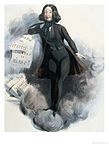Edward de Vere, the 17th Earl of Oxford, is now widely accepted as the legitimate author of the plays and sonnets attributed to the illiterate Stratford businessman, Will Shaksper. I won't go into the voluminous evidence for this claim as it has been investigated and produced in countless publications. De Vere wrote because he had to - to silence the voices in his head; to exorcise the demons, to relieve his profound unhappiness with the title and constrictions forced upon him by noble birth and the times he lived in. to rouse the mob to action. He was Hamlet, an observation not lost on his peers at the time. He watched from a darkened box as his words took effect on the populace. Nearing death he wrote of dying finally, obscure and quickly forgotten. and for centuries he was right about that. Jane Austen suffered a similar fate. Still by several strokes of luck their work survived. All of it speaks to us of our own lives and times. In a television interview the director, Mike Nichols, said that he always thought his plays and films were about this or that social or political ill that needed to be aired. But late in life he understood they were all about himself. Isn't that always the way. It's not just that we prefer to watch from the back row of the darkened theater. We require anonymity to protect our psyches, our innermost thoughts, from public exposure. Dorothy Parker wrote a story about her love for Robert Benchley. She titled it, "Big Blonde" of course. She was a small brunette. As I watched Mike Nichols on the screen, I nodded. I create all of my protagonists as men. As much as we may know that it is "all about ourselves" what we wish for is not notoriety or acclaim, but that the work - our progeny - will outlast us, speak for us, reach people and move them. to action, to tears. to love.
Edward de Vere was born this day in 1550. The article above was guest-blogged by Lila York.





